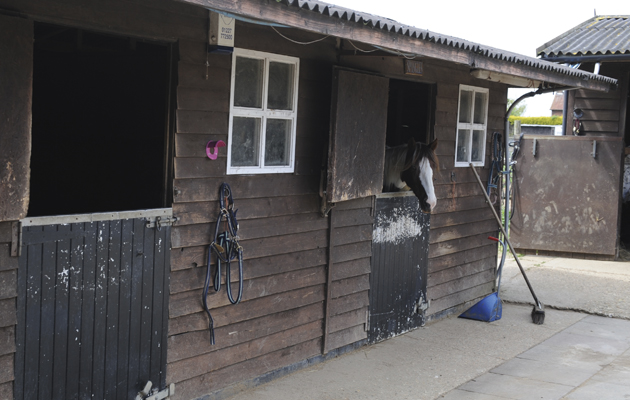Horse & Hound reports from the first Equestrian Employers Association conference where topics included how to balance the business books while complying with current legislation...
Equestrian businesses have called for the equestrian world to unite if the industry is to have a viable future.
The message came during debate at the inaugural Equestrian Employers Association (EEA) conference, held at Stallion AI Services in Shropshire on 25 February.
The incoming rise in the minimum wage for all ages from 1 April, and the Conservative Party’s election pledge to raise this to £10.50 within five years for over-25s, sparked discussion on how equestrian businesses can survive.
{"content":"PHA+4oCcSSBkb27igJl0IHRoaW5rIGFueSBvZiB1cyBpbiB0aGlzIHJvb20gd2FudCBub3QgdG8gZW1wbG95IHN0YWZmIGNvcnJlY3RseSDigJQgSSBkb27igJl0IHRoaW5rIGFueW9uZSBkZWxpYmVyYXRlbHkgd2FudHMgdG8gYXZvaWQgZG9pbmcgdGhpbmdzIHRoZSB3YXkgdGhleSBzaG91bGQs4oCdIHNhaWQgTWlrZSBIYWxsb3dzLCBvZiBIdWJiYXJkcyBIYWxsIExpdmVyeS48L3A+CjxwPjxkaXYgY2xhc3M9ImFkLWNvbnRhaW5lciBhZC1jb250YWluZXItLW1vYmlsZSI+PGRpdiBpZD0icG9zdC1pbmxpbmUtMiIgY2xhc3M9ImlwYy1hZHZlcnQiPjwvZGl2PjwvZGl2PjxzZWN0aW9uIGlkPSJlbWJlZF9jb2RlLTMxIiBjbGFzcz0iaGlkZGVuLW1kIGhpZGRlbi1sZyBzLWNvbnRhaW5lciBzdGlja3ktYW5jaG9yIGhpZGUtd2lkZ2V0LXRpdGxlIHdpZGdldF9lbWJlZF9jb2RlIHByZW1pdW1faW5saW5lXzIiPjxzZWN0aW9uIGNsYXNzPSJzLWNvbnRhaW5lciBsaXN0aW5nLS1zaW5nbGUgbGlzdGluZy0tc2luZ2xlLXNoYXJldGhyb3VnaCBpbWFnZS1hc3BlY3QtbGFuZHNjYXBlIGRlZmF1bHQgc2hhcmV0aHJvdWdoLWFkIHNoYXJldGhyb3VnaC1hZC1oaWRkZW4iPg0KICA8ZGl2IGNsYXNzPSJzLWNvbnRhaW5lcl9faW5uZXIiPg0KICAgIDx1bD4NCiAgICAgIDxsaSBpZD0ibmF0aXZlLWNvbnRlbnQtbW9iaWxlIiBjbGFzcz0ibGlzdGluZy1pdGVtIj4NCiAgICAgIDwvbGk+DQogICAgPC91bD4NCiAgPC9kaXY+DQo8L3NlY3Rpb24+PC9zZWN0aW9uPjwvcD4KPHA+4oCcW1RoZSBlcXVlc3RyaWFuIHdvcmxkXSBpcyBzdWNoIGEgbGlmZXN0eWxlIGFuZCBhIGh1Z2UgYW1vdW50IG9mIHdvcmsgdG8gZ2V0IHRoZSBqb2IgZG9uZS48L3A+CjxwPuKAnEhvdyBkbyB3ZSBwZXJzdWFkZSBnb3Zlcm5tZW50IHRoYXQgd2hhdCB3ZSBkbyBpcyBpbXBvcnRhbnQgYW5kIHRvIG91ciBjbGllbnRzIHRoYXQgdGhleSBhcmUgZ29pbmcgdG8gaGF2ZSB0byBwdXQgdGhlaXIgaGFuZHMgaW4gdGhlaXIgcG9ja2V0cyBhIGJpdCBkZWVwZXI\/4oCdPC9wPgo8cD5Sb3NpZSBMb3JkLCBvd25lciBvZiBCZXJrc2hpcmUgUmlkaW5nIENlbnRyZSwgc2FpZCBpbiBoZXIgZXhwZXJpZW5jZSwgYmVpbmcgb3BlbiBhbmQgaG9uZXN0IHdpdGggY2xpZW50cyBhYm91dCB3aGVyZSBjb3N0cyBoYXZlIHByZXZpb3VzbHkgYmVlbiBhYnNvcmJlZCBieSB0aGUgYnVzaW5lc3MsIHdoeSB0aGF0IGNhbm5vdCBoYXBwZW4gZm9yZXZlciBhbmQgdGhlcmVmb3JlIHdoeSBwcmljZXMgaGF2ZSB0byByaXNlLCBpcyB0aGUgd2F5IGZvcndhcmQuPC9wPgo8ZGl2IGNsYXNzPSJhZC1jb250YWluZXIgYWQtY29udGFpbmVyLS1tb2JpbGUiPjxkaXYgaWQ9InBvc3QtaW5saW5lLTMiIGNsYXNzPSJpcGMtYWR2ZXJ0Ij48L2Rpdj48L2Rpdj4KPHA+SW50ZXJuYXRpb25hbCBldmVudGVyIEZyYW5jaXMgV2hpdHRpbmd0b24gc2FpZCB0aGUgdGltZSBoYXMgY29tZSBmb3IgYSDigJx1bml0ZWQgZnJvbnTigJ0gYW5kIHBlcmhhcHMgYSBndWlkZSB0byB0aGUgYmFzZWxpbmUgY29zdHMgb2YgcnVubmluZyBhIHlhcmQuPC9wPgo8cD7igJxJdCBpcyBhIGxpZmVzdHlsZSwgYnV0IHlvdSBzdGlsbCBoYXZlIHRvIGJlIGFibGUgdG8gcGF5IGZvciBldmVyeXRoaW5nLOKAnSBoZSBzYWlkLiDigJxJZiBvbmUgeWFyZCBpcyB1bmRlcmN1dHRpbmcsIHRoYXQgZGV2YWx1ZXMgdGhlIHdob2xlIGluZHVzdHJ5LuKAnTwvcD4KPGRpdiBjbGFzcz0iYWQtY29udGFpbmVyIGFkLWNvbnRhaW5lci0tbW9iaWxlIj48ZGl2IGlkPSJwb3N0LWlubGluZS00IiBjbGFzcz0iaXBjLWFkdmVydCI+PC9kaXY+PC9kaXY+CjxwPlRoZSBxdWVzdGlvbiB3YXMgcHV0IHRvIHRoZSBFRUEgYXMgdG8gd2hldGhlciBpdCB3b3VsZCBldmVyIGNvbnNpZGVyIGFuIGFncmVlbWVudCB3aXRoIHRoZSBCcml0aXNoIEdyb29tcyBBc3NvY2lhdGlvbiAoQkdBKSBvbiB3b3JraW5nIGhvdXJzIGFuZCBwYXksIGluIGEgc2ltaWxhciB3YXkgdG8gdGhlIHJhY2luZyBpbmR1c3RyeS48L3A+CjxwPkluIHJhY2luZywgdGhlIE5hdGlvbmFsIEFzc29jaWF0aW9uIG9mIFJhY2luZyBTdGFmZiDigJQgYSB1bmlvbiwgdW5saWtlIHRoZSBCR0Eg4oCUIGFuZCB0aGUgTmF0aW9uYWwgVHJhaW5lcnMgRmVkZXJhdGlvbiBhbm51YWxseSBhZ3JlZSBhIG1pbmltdW0gcmF0ZXMgb2YgcGF5IHN0cnVjdHVyZS4gVGhpcyBjb3ZlcnMgZXZlcnl0aGluZyBmcm9tIG1pbmltdW0gcmF0ZXMsIGRlcGVuZGVudCBvbiBleHBlcmllbmNlIGFuZCByb2xlLCB3ZWVrbHkgaG91cnMsIG92ZXJ0aW1lIGJvdGggb24gYW5kIGF3YXkgZnJvbSB0aGUgeWFyZCwgZXhwZW5zZXMgYW5kIG1vcmUuPC9wPgo8ZGl2IGNsYXNzPSJhZC1jb250YWluZXIgYWQtY29udGFpbmVyLS1tb2JpbGUiPjxkaXYgaWQ9InBvc3QtaW5saW5lLTUiIGNsYXNzPSJpcGMtYWR2ZXJ0Ij48L2Rpdj48L2Rpdj4KPHA+QkdBIGNoaWVmIGV4ZWN1dGl2ZSBMdWN5IEthdGFuIGV4cGxhaW5lZCB0aGUgd2F5IHRoZSBncm9vbXPigJkgYW5kIGVtcGxveWVyc+KAmSBhc3NvY2lhdGlvbnMgaW4gdGhlIHdpZGVyIGluZHVzdHJ5IHdvcmsgYXJlIGRpZmZlcmVudC48L3A+CjxwPuKAnENvdWxkIHdlIGRvIHNvbWV0aGluZyBbc2ltaWxhcl0gd2l0aCB0aGUgQkdBIGFuZCBFRUE\/IEl0IHdvdWxkbuKAmXQgYmUgdGhlIHNhbWUgYmVjYXVzZSBpdCBpcyBhIHZlcnkgZGlmZmVyZW50IHJlbGF0aW9uc2hpcCBiZXR3ZWVuIHRoZSB0d28gb3JnYW5pc2F0aW9ucyzigJ0gc2hlIHNhaWQuIOKAnFdoYXQgd2UgY291bGQgZG8gaXMgd29yayB0byBjcmVhdGUgc29tZSBhZHZpY2UgZm9yIGVtcGxveWVycy7igJ08L3A+CjxwPlNoZSBzYWlkIHRoZXkgY2FuIGxvb2sgYXQgY3JlYXRpbmcgYSBjb3N0LXBlci1kYXkgZ3VpZGFuY2Ugb24ga2VlcGluZyBkaWZmZXJlbnQgdHlwZXMgb2YgaG9yc2VzLCB3aGljaCBjb3VsZCBzZXJ2ZSBhcyBhIGd1aWRlIGZvciBib3RoIGVtcGxveWVycyBhbmQgZWR1Y2F0aW9uIGZvciBvd25lcnMuPC9wPgo8cD7igJxXZSBoYXZlIHRvIGV4cGVjdCBhIHJpc2Ugb2YgNDRwIGV2ZXJ5IHllYXIgW3RvIHRoZSBtaW5pbXVtIHdhZ2VdLOKAnSBzYWlkIE1zIEthdGFuLCBhZGRpbmcgdGhlIGluZHVzdHJ5IGhhcyBiZWVuIG9uIHRoZSBiYWNrIGZvb3Qgd2hlbiBpdCBjb21lcyB0byB1bmRlcnN0YW5kaW5nIHN0YWZmaW5nIGNvc3RzLiDigJxJdCBpcyBnb2luZyB0byBnbyB1cCBhbmQgdXAgb24gYWxsIFthZ2VdIGxldmVscy48L3A+CjxwPuKAnEkgZmVlbCB0aGF0IG5vdyB3ZSBhcmUgY2F0Y2hpbmcgdXAgdmVyeSBxdWlja2x5IGFuZCB1bmZvcnR1bmF0ZWx5IHdlIGFyZSBnZXR0aW5nIGNhdWdodCBvdXQuIEnigJl2ZSBuZXZlciBoZWFyZCBvZiBzbyBtYW55IG1pbmltdW0gd2FnZSBpbnZlc3RpZ2F0aW9ucyBhcyBub3cuIOKAnDwvcD4KPGgzPldoYXQgaWYgSSBicmVhayB0aGUgcnVsZXM\/PC9oMz4KPHA+VGhlIGZpbmFuY2lhbCBhbmQgZW1vdGlvbmFsIHN0cmVzcyBhbiBITVJDIGludmVzdGlnYXRpb24gYnJpbmdzIHdlcmUgcmFpc2VkIGFuZCBlbXBsb3llcnMgd2VyZSB3YXJuZWQgaXQgaXMgbm90IGEgY2FzZSBvZiBvbmx5IOKAnGJhZOKAnSBlbXBsb3llcnMgdGhhdCBjYW4gYmUgYWZmZWN0ZWQuPC9wPgo8cD5FdmVuIHRob3NlIHdobyBhcmUgYWltaW5nIHRvIGRvIHRoZSBtb3JhbGx5IHJpZ2h0IHRoaW5nIGFuZCBiZSBsZWdhbGx5IGNvbXBsaWFudCB3ZXJlIHVyZ2VkIHRvIGVuc3VyZSB0aGVpciByZWNvcmRzIGFyZSBtZXRpY3Vsb3VzLCBhcyBzaG91bGQgdGhlIGluc3BlY3RvcnMgY29tZSBrbm9ja2luZywgZXZlcnl0aGluZyB3aWxsIGJlIHB1bGxlZCBhcGFydC48L3A+CjxwPlRoZSBnb29kIG5ld3MgaXMgdGhhdCBhIGxvdCBvZiB0aGlzIGlzIHNpbXBsZSDigJQgcmlkZXJzIHdlcmUgZW5jb3VyYWdlZCB0byBtYWtlIHVzZSBvZiB0aGVpciB5YXJkIGRpYXJpZXMsIHdoaWNoIG1vc3Qgc3RpbGwgdXNlOyByZWNvcmRpbmcgYXQgdGhlIHRvcCBvZiBlYWNoIGRheSB3aG8gaXMgaW4sIHdobyBpcyBvbiBob2xpZGF5LCBzdGFydCBhbmQgZmluaXNoIHRpbWVzIGFuZCBsdW5jaGJyZWFrcywgYW5kIGFza2luZyBtZW1iZXJzIG9mIHN0YWZmIHRvIHNpZ24gYXQgdGhlIGVuZCBvZiBlYWNoIGRheSBvciB3ZWVrIHRvIGNvbmZpcm0gaXQgaXMgYW4gYWNjdXJhdGUgcmVjb3JkIG9mIHdoYXQgdGhleSBkaWQuIFdoaWxlIG5vdCBhIGd1YXJhbnRlZSwgdGhlIGNvbmZlcmVuY2UgaGVhcmQgaGF2aW5nIHNvbGlkIHJlY29yZHMgaXMgYSB2aXRhbCBwYXJ0IG9mIGEgZGVmZW5jZS48L3A+CjxwPlBoaWwgQ29ubGV5LCBmcm9tIEhNUkPigJlzIHByb21vdGluZyBjb21wbGlhbmNlIHRlYW0sIHRvbGQgdGhlIGNvbmZlcmVuY2UgY29tbW9uIGNhdXNlcyBvZiB1bmRlcnBheW1lbnQgYXJlIG5vdCBkZWxpYmVyYXRlLCBidXQgYXJlIGluc3RlYWQg4oCcZXJyb3IgZHJpdmVu4oCdLiBGb3IgZXhhbXBsZSwgaW5jb3JyZWN0bHkgYXBwbHlpbmcgdGhlIGFjY29tbW9kYXRpb24gb2Zmc2V0LCB0aGUgbGltaXQgdG8gdGhlIHZhbHVlIG9mIGFjY29tbW9kYXRpb24gcHJvdmlkZWQgYnkgYW4gZW1wbG95ZXIuPC9wPgo8cD7igJxJdCBhcHBlYXJzIHNpbXBsZSwgYnV0IHRoZSBkZXZpbCBpcyBpbiB0aGUgZGV0YWlsLOKAnSBoZSBzYWlkLjwvcD4KPHA+VGhlIHBlbmFsdGllcyBhcmUgaHVnZSDigJQgYXJyZWFycyBjYW4gYmUgYmFja2RhdGVkIGFzIGZhciBhcyBzaXggeWVhcnMsIHRvIGJlIHBhaWQgYmFjayBhdCB0aGUgY3VycmVudCBtaW5pbXVtIHdhZ2UgcmF0ZXMsIGFzIHdlbGwgYXMgYSAyMDAlIGZpbmUgYW5kIMKjNTAwIGlmIHRoZSBlbXBsb3llciBpcyBuYW1lZCBpbiBhIGdvdmVybm1lbnQgcHJlc3MgcmVsZWFzZS4gVGhhdCBpcyBiZWZvcmUgbGVnYWwgY29zdHMgYXJlIHRha2VuIGludG8gYWNjb3VudC48L3A+CjxwPuKAnFRoZSBjb3N0cyBvZiBnZXR0aW5nIGl0IHdyb25nIGFyZSB2ZXJ5IGhhcnNoLOKAnSBNciBDb25sZXkgc2FpZC4g4oCcV2UgZW5jb3VyYWdlIGVtcGxveWVycyB0byBjYXJyeSBvdXQgdGhlIG5lY2Vzc2FyeSBjaGVja3MsIGFuZCBwdXQgaXQgcmlnaHQu4oCdPC9wPgo8cD5CYXJyaXN0ZXIgVmljdG9yaWEgdm9uIFdhY2h0ZXIgc3BlY2lhbGlzZXMgaW4gZXF1ZXN0cmlhbiBhbmQgZW1wbG95ZW1lbnQgbGF3IGFtb25nIG90aGVyIGFyZWFzLjwvcD4KPHA+4oCcRG9pbmcgd2hhdCBpcyBtb3JhbGx5IHJpZ2h0IGFuZCB3aGF0IGlzIGFjY2VwdGFibGUgdG8gYm90aCBzaWRlcyBvZiB0aGUgZXF1YXRpb24gc2FkbHkgd2lsbCBub3QgZ2V0IHlvdSBvdXQgb2YgamFpbCB3aGVuIGl0IGNvbWVzIHRvIGxlZ2FsIGNvbXBsaWFuY2Us4oCdIHNoZSBzYWlkLCB3YXJuaW5nIG9mIHRoZSB0b2xsIGNvdXJ0IGFwcGVhcmFuY2VzIHRha2Ugb24gYWxsIHNpZGVzLiDigJxUaGUgcmVhbGl0eSBpcyB5b3UgbXVzdCBjb21wbHkgd2l0aCB0aGUgbGF3IGFuZCB2ZXJ5IG9mdGVuIHRoZSBsYXcgZG9lc27igJl0IGdpdmUgdGhlIHNlbnNlIG9mIGZhbWlseSBhbmQgY29tZm9ydCB0aGF0IHdvcmtpbmcgZm9yIGEgW2dvb2RdIGVtcGxveWVyIHdpbGwgZ2l2ZSB0byBhbiBlbXBsb3llZS7igJ08L3A+CjxkaXYgY2xhc3M9ImluamVjdGlvbiI+PC9kaXY+CjxwPlNoZSBhZGRlZCB0aGUgdm9jYXRpb25hbCBuYXR1cmUgb2YgdGhlIGluZHVzdHJ5IG1lYW5zIHZlcnkgb2Z0ZW4gZW1wbG95ZWVzIHdpbGwgaGFuZyBhcm91bmQgYWZ0ZXIgdGhlaXIgd29ya2luZyBkYXkgaGFzIG9mZmljaWFsbHkgZmluaXNoZWQsIHdoaWNoIGlzIGZpbmUsIGJ1dCB1cmdlZCBlbXBsb3llcnMgdG8gYmUgdmVyeSBjbGVhciBhYm91dCB3aGF0IHRpbWVzIHNvbWVvbmUgaXMgYW5kIGlzIG5vdCB3b3JraW5nLjwvcD4KPHA+4oCcWW91IGFyZSBub3QgYnJlYWtpbmcgYW55IGxhdyBieSBub3QgcmVjb3JkaW5nIGhvdXJzLCBidXQgeW91IHdvdWxkIGJlIGZvb2xpc2ggbm90IHRvLOKAnSBzaGUgc2FpZCwgYWRkaW5nIGVtcGxveWVycyBhcmUgcHV0dGluZyB0aGVtc2VsdmVzIGF0IHJpc2sgaWYgaXQgY29tZXMgZG93biB0byB0aGVpciB3b3JkIGFnYWluc3QgZW1wbG95ZWVz4oCZLiDigJxUaGUgbW9yZSBwaWVjZXMgb2YgcGFwZXIgeW91IGhhdmUsIHRoZSBzYWZlciB5b3UgYXJlIGdvaW5nIHRvIGJlLuKAnTwvcD4KPHA+Cg=="}
You may also be interested in…
Stay in touch with all the news in the run-up to and throughout the major shows and events during 2025 and beyond with a Horse & Hound subscription. Subscribe today for all you need to know ahead of these major events, plus online reports on the action as it happens from our expert team of reporters and in-depth analysis in our special commemorative magazines. Have a subscription already? Set up your unlimited website access now
H&H senior news writer
Lucy is an experienced news journalist, reporter and presenter. Since joining the Horse & Hound team in 2015, Lucy has reported from major global sporting events including the Tokyo Paralympic Games and multiple European Championships, as well as Badminton, Burghley and London, to name a few. She has covered current affairs and sports news across the full spectrum of equestrian disciplines and racing, as well as human and equine welfare, industry news and court cases.






